From the Paddock: Stories from Organic Farmers across Aotearoa New Zealand
Meet the organic farmers working on the ground, helping us build a better future.
Organics Aotearoa New Zealand is working to grow and support the next generation of organic farmers. Can you help us build a resilient, healthy and fair farming future? Please donate to our Farming for the Future: Matching Gift Challenge today, and our generous supporter, Gary Hirshberg, has offered to match every dollar up to $60k.
These funds will help power our work to transition to a resilient, healthy and fair farming future. More farmers converting more land to organic is a better outcome for all New Zealanders.
Donate today and see your impact go twice as far. Whether you donate $5, $50 or $500, every bit helps.
The Stevenson family have been farming sheep in Southland since 1937. Despite always being a low-input property, third-generation farmers George and Bronnie Stevenson decided to go fully organic 15 years ago after discovering George's father had cancer.
The Stevenson family feel chemicals are not good for the land, their animals or human health long term, and they firmly believe how we farm has to change. George and Bronnie have also been busy raising the next generation of future farmers; their three kids, Cassidy, Olivia and Ashley, are all studying agriculture at Lincoln University — all three are keen to be part of a sustainable farming future.
George said ''the hardest part of becoming an organic farmer is making the decision''.
Malkiat (Kingseat Organics) farms organically because he believes we are what we eat. He didn't want to feed his babies food grown using synthetic chemical-based fertilisers, poisonous insecticides and cancer-causing weedkillers.
Malkiat was growing his own food initially, but during the covid lockdown, he had the opportunity to start growing for his local community. They also plant a few hundred native trees every year, boosting biodiversity and making their own compost.
Malkiat says, ''We have learnt that growing organically is a great way to combat climate change. We trap so much carbon into the soil through our carbon crops, reducing the need for fertilisation, and we have chickens and pet water buffaloes on our small farm. We reuse animal manure as compost and thus create a living cycle of nutrients that is served to our lovely customers. We are also experimenting with making organic tea, organic skincare, and haircare. And it all starts for the same reasons; we want our local communities to be healthy and happy.''
By adopting an organic diversified operation that includes vegetable and fruit production and animals, Malkiat believes he can create a truly sustainable local economy AND produce a huge amount of organic food, which becomes affordable and accessible for every Kiwi.
Meet Allan Richardson, an organic and regenerative farmer from West Otago and a board member of Organics Aotearoa New Zealand.
Allan and his wife Sonia thought going organic would better serve their future. That was back in 1997. Three years later, they achieved certification on the 1,300-hectare sheep and beef property. The Richardsons are also using regenerative farming methods to improve the soil quality on the property, which carries about 11,000 stock units.
Allan says he combines the best of both worlds, working with nature — with soil and animal health as a core focus.
"For me, the ultimate food is coming off an organic farm with regenerative principles attached to it, and that's what we're doing."
Meet Tony and Afsaneh Howey, south Canterbury organic blackcurrant growers and owners of the ViBERi brand.
After many years of vegetable and arable farming, in 2014, Tony and Afsaneh decided to move away from commodities and add value through branded products
that wouldn’t compromise health, quality or the environment. As people move away from highly processed food, consumers have become more interested in the origin of where that food comes from and how it was produced.
Tony said ViBERi has a very authentic story, and organically grown means their customers can have absolute trust and confidence in their products. ''It is very meaningful work to produce healthy organic food and sell this direct to consumers''.
Join our pledge for an organic future here in Aotearoa New Zealand. Please donate to our Farming for the Future: Matching Gift Challenge today, and a generous donor has offered to match every dollar up to $60k during August.




